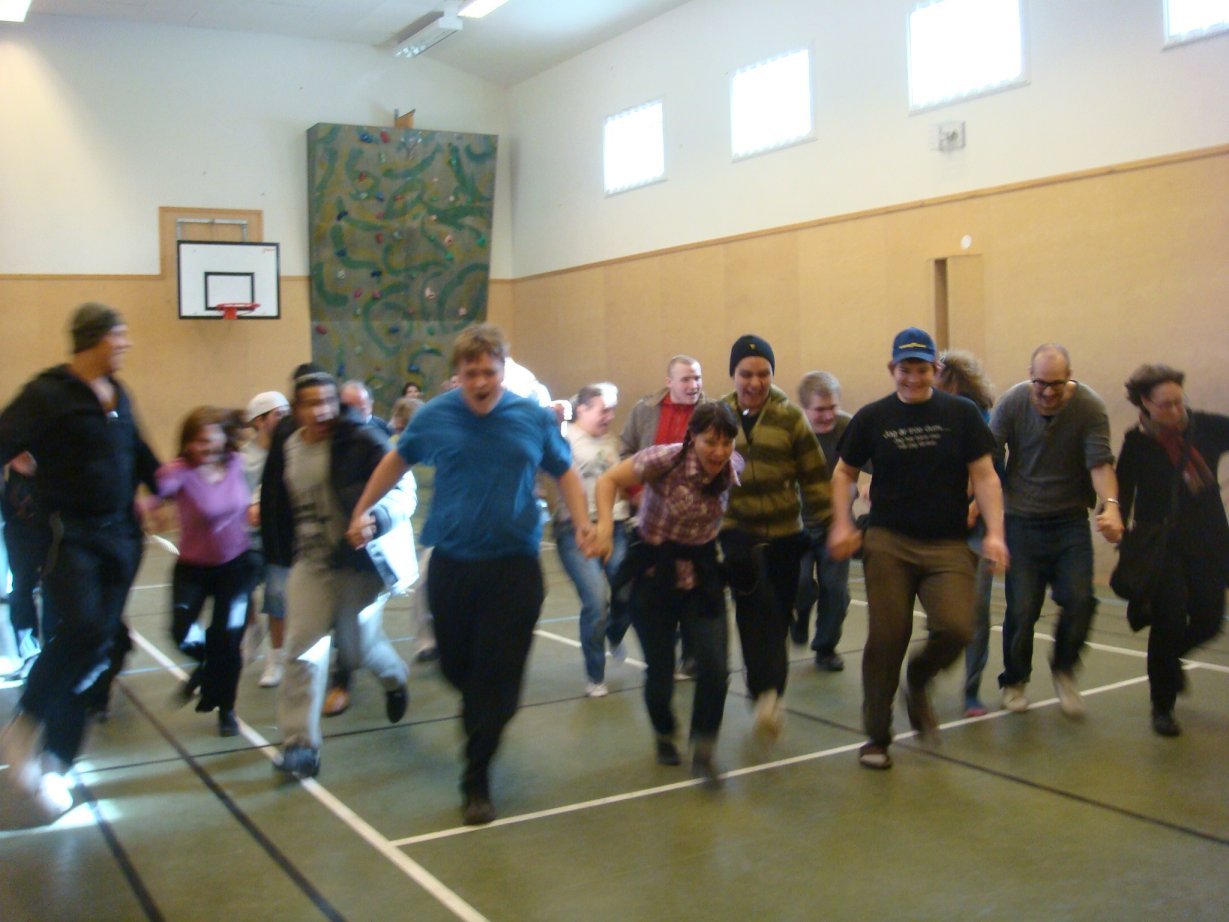
A circus workshop in a young offender's centre in Sweden
Credible training
A training programme for artists working in prisons has just gained international accreditation, announces Alan Clarke.
I am delighted to relate that the Cred-ability programme was formally approved by the College of Teachers last month. The programme was submitted at two levels: Level 3 for artists “who, whilst proficient in their chosen art-form, have little or no experience of delivering art in prisons”, and at Level 5 for those “who are both proficient in their chosen art-form and have some experience of delivering art in prisons, but need to hone their teaching skills more effectively”.
The positive implications of this are already being felt, especially in Northern Ireland where our partner the Prison Arts Foundation (PAF) has been running a pilot at Level 5 for artists currently working in the province’s three prisons. Recent changes in its justice system mean that in future arts practitioners will need a teaching qualification to continue delivering projects with inmates. So they now have the opportunity to do this, by successfully completing the Cred-ability training course. It is anticipated that around nine of them will do so by the autumn.
This module asks artists to examine their critical position and suitability for working in prisons
In England, on the other hand, the opportunities for artists to work in prisons are increasingly limited, coming mainly through prison education departments or well-established arts organisations which often run their own induction courses. In other European countries the need for a properly accredited training programme is seen as very relevant. The Cred-ability partners, the Latvia Culture College and the Lithuanian University of Educational Science, are intending to offer Level 3 courses for artists and trainee arts teachers respectively, while keen interest has already been expressed by arts groups in Germany and the Catalonian Justice Department. In addition, the training programme is currently being adapted for ICT and multimedia practitioners as part of the EU-funded PriMedia Network and for teachers of language acquisition for incarcerated foreign nationals through the Languages Behind Bars project.
Zīna Ceske, a visual artist working in Latvia, said: “[Art classes] make a positive contribution to prisoner rehabilitation, the prisoners… get both practical and philosophical benefits. On the practical side, they become part of a project that is happening within the prison and in the community. The philosophical benefit of arts in prison projects is the strength it offers those prisoners committed to their rehabilitative processes and to ‘going forward’.”
So, what makes the programme attractive to arts practitioners and prison teachers? First, it has a simple framework (three modules, two core and one elective), which can easily be adapted to different subject areas and contexts. Second, it can be delivered using a wide range of approaches including formal face-to-face lectures, practical workshops, small group seminars and even online. Third, it can be delivered in a relatively short period, a crucial factor for those with limited free time. At Level 3 the course content can be covered in around 30 hours and at Level 5 in 18 to 20 three-hour sessions. The PAF pilot is running nine consecutive Saturdays, including a couple of online sessions. Fourth, the assessment is based primarily on evaluating current practice through vocationally focused tasks, evidenced via a range of methods including written assignments, portfolio evidence, vive voce and observation of practice. Accreditation of prior learning is also possible.
The content of the training programme for artists delivering artistic, creative and therapeutic activities in a prison context covers three main areas:
- Core Module 1, Preparing to deliver: This module covers background information such as the role and history of the particular national justice system and the types of penal institutions, fundamental issues such as the ethics and rationale for using arts with inmates, the specific conditions to be found in prison and the skills, including pedagogic and communication ones, needed to be effective in this context. The Level 5 programme also covers organisational and funding issues.
- Core Module 2, Critical thinking: This module asks artists to examine their critical position and suitability for working in prisons; the attitude and obstacles that they are likely to meet from the staff, the prison service and the participants, and how a critical attitude can be instilled through arts interventions. (More on this in Hannah Hull’s article, also in this feature.)
- Elective Module 3, Organising and delivering arts interventions: This deals with the practical application of arts activities to prisoners, including awareness of past and current practice; the specific preparations and requirements for working in prisons; the organisation and delivery of interventions, including the creation of artform products; encouraging the acquisition of specific artform skills by inmates; and the process of evaluating and reflecting on these activities. There are two extra elements at Level 5: identifying good practice criteria and the exploitation of arts products for the benefit of inmates. Although this module genetically covers all artforms, in practice candidates can focus on their particular specialisms.
In terms of delivery, the application identifies two alternatives: the sequential model in which the elements of individual modules are covered in order; and the thematic model, with each session combining elements of different modules under a specific heading. In practice, as the piloting to a variety of audiences and under differing conditions in the five partner countries identified, a combination of approaches can be used, including online. An important pre-condition, especially at Level 5, is learners having access to prison experience, either directly or through practitioners who have worked with inmates.
Dr Alan Clarke is Cred-ability Project Coordinator at the College of Teachers.
The training programme will be officially launched at the Cred-ability International Conference at the College of Teachers, London, on Friday 5 and Saturday 6 September.
Join the Discussion
You must be logged in to post a comment.